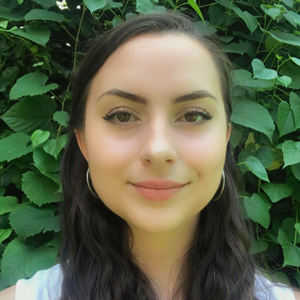From camp to career: Igniting a lifelong love of science

Manchego
Nearly nine years ago, Jordan Manchego’s journey with the HudsonAlpha Institute for Biotechnology began. Growing up in Huntsville, Ala., Jordan had a variety of options for science camps and experiences. In 2013, her mom found something new – HudsonAlpha’s summer camp “I Want to Work in a Lab Coat.”
Jordan quickly realized it was different from other summer science camps she had attended. The instructors allowed the campers to use real test tubes and reagents. During the camp, Jordan was inspired and the experience gave her an appreciation that DNA defines all life.
New experiences for career prep
The following summer, Jordan participated in the summer short course offered by HudsonAlpha. The summer short course is an intensive three-week summer course for high school students to explore synthetic biology. Through that experience, she was exposed to new techniques such as micropipetting, bioinformatics and polymerase chain reaction (PCR) amplification.
PCR amplification is a basic biology lab technique used to make many copies of a specific DNA region in a test tube. Making copies of the DNA allows for certain components to be studied in detail during experiments. Oftentimes, students are exposed to hands-on PCR experiments for the first time during their undergraduate lab experiences, so getting to do this as a high school student is unique.
“Being exposed to equipment and experiments that were not available at my high school was amazing,” said Manchego. “The field is constantly expanding and changing and that excitement hooked me.”
Internship gives inspiration
Two years after completing the summer short course, Manchego again came to HudsonAlpha for “Sample to Sequence,” an internship experience for undergraduate and high school students. The program introduced students to many lab procedures and techniques by collecting environmental samples (primarily soil) and extracting genetic material for study.
“I was so happy to be at HudsonAlpha each morning,” said Manchego. “Continuing to work in the field and learning new techniques really helped me continue on the path to a biotech career.”
The program was created to give students growth opportunities to design and formulate their own experiments. It concluded with a poster session and an opportunity to meet professionals from the Institute and explain the work the students completed during the program.
“The Institute is very open for communication and it was built for open dialogue,” said Manchego. “I met some great people who really inspired me to continue pursuing my goals of working in biotechnology.”
What’s next
Manchego completed high school and because of her passion for science and experiences with HudsonAlpha, she decided to attend the University of Alabama in Huntsville (UAH) and major in biochemistry.
“When we see students enter HudsonAlpha’s programs, we are inspired knowing that we are part of the growth and development of tomorrow’s STEM workforce,” Michele Morris, HudsonAlpha workforce development lead.
While in college, Manchego decided that it was time for her to give back to the local science community that had given so much to her. She volunteered with HudsonAlpha’s Advanced Placement Program for Learning Enhancement (APPLE). APPLE places volunteer scientists and college students in high school classrooms with equipment and materials for classroom lab experiments. Through volunteering with APPLE, Manchego visited nearly every local Huntsville high school and engaged with hundreds of students.
In addition to volunteering with APPLE, Manchego assisted with HudsoAlpha’s Launching Inspiring Biotechnology Students (LABS) program. LABS is an after school program that equips high school students from disadvantaged and under-represented populations with the skills and knowledge to join tomorrow’s stem-based workforce.
“Through these volunteer experiences, I gained a lot,” commented Manchego. “I was teaching students, but I had just been in their shoes. I was able to not only help them with the lab work but also answer questions about college applications and the transition process.”
Pandemic virtual internship
In the spring of 2020, Manchego applied for the HudsonAlpha BioTrain Internship program. Due to the COVID-19 pandemic, the program pivoted and placements that could be conducted remotely were transitioned. On the recommendation of a professor, Manchego applied for a position in the Harkess Lab. Before applying, she did not have very much experience with plant science or botany, but the little exposure she did have piqued her curiosity.
“When I got the email that I had been accepted to the BioTrain program, I cried because I was so happy,” said Manchego. “As COVID-19 evolved, that opportunity was almost taken away, but luckily, HudsonAlpha was able to find a way to continue the internship remotely.”

Caption: A) Duckweed image from a time-lapse dataset. B) Using a Computer Vision software tool, PlantCV, Jordan wrote code that analyzed each frame of the duckweed dataset. C) Jordan’s analysis calculated the relative growth rates of duckweeds growing in different conditions.
Going into the internship, Manchego only had a little experience with computer programming for biology. Regardless, she jumped into her internship project feet first. Manchego’s supervisor, Alex Harkess, PhD, Assistant Professor, Auburn University, Department Of Crop, Soil, And Environmental Sciences and Faculty Investigator, HudsonAlpha Institute For Biotechnology, tasked her with documenting the growth of a plant called duckweed. They approached the project by using timelapse videos of the growth progression. Manchego was able to use skills she learned in her introductory biology coding class as well as learn new tactics to write scripts that would analyze what happened on the video feed and catalog those findings.
“Once I got the hang of it, I appreciated that these are powerful tools for studying plants,” said Manchego. “Duckweed doesn’t have a stem, so I had to adjust the tools in order to get the readings that we needed for this project.”
Using this project, Manchego was able to share her work at an online national conference with the Botany Society of America. She met many students and professional scientists in the botany field.
“My experience during the BioTrain internship coupled with my time engaging at the conference cemented my decision to continue pursuing a career in plant science and botany,” she said.
Influences
Manchego credits her mom, who is a software engineer, for always encouraging her to explore STEM opportunities. She said she is a big reason why she grew up loving science.
“Often, girls are discouraged from playing with dinosaurs and learning about space, but my mom and dad encouraged me to explore my interests,” reflected Manchego.
Manchego said that she really appreciated seeing so many female scientists at HudsonAlpha. Their professionalism and love of science was a formative experience for her. In addition, Manchego said that her current supervisor, Dr. Harkess, has been a great mentor and wonderful to work with.
Manchego is expected to graduate from UAH in May and will begin a PhD program at Michigan State University this fall. The program includes a scholarship and a fellowship.
“When Jordan won a competitive fellowship for first year PhD students at MSU, a top school for plant biology, I was proud,” said Harkess. “It really is amazing what Biotrain did to propel her — and to be honest, it invigorated me to put more effort into the students who pass through our lab in order to continue that pipeline into plant sciences and botany fields.”
“I am truly thankful for my experiences with HudsonAlpha,” said Manchego. “This is the experience that keeps on giving and I am confident that this is a springboard for my career.”
In April, Manchego was awarded the Young Botanist Award from the Botany Society of America. Each year, the society selects 25 recipients to offer individual recognition to outstanding graduating seniors in the plant sciences and to encourage participation in the Botanical Society of America.
If you would like to support HudsonAlpha’s educational programming to help build tomorrow’s STEM workforce, visit hudsonalpha.org/education-give.

